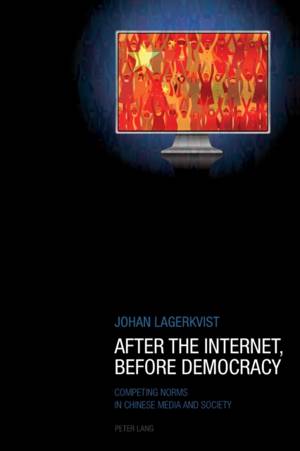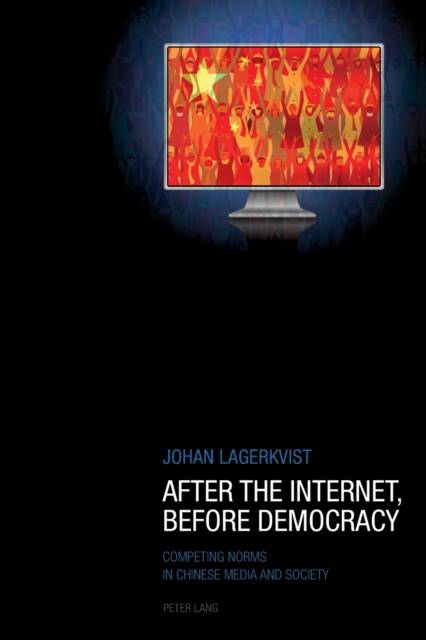
Door een staking bij bpost kan je online bestelling op dit moment iets langer onderweg zijn dan voorzien. Dringend iets nodig? Onze winkels ontvangen jou met open armen!
- Afhalen na 1 uur in een winkel met voorraad
- Gratis thuislevering in België vanaf € 30
- Ruim aanbod met 7 miljoen producten
Door een staking bij bpost kan je online bestelling op dit moment iets langer onderweg zijn dan voorzien. Dringend iets nodig? Onze winkels ontvangen jou met open armen!
- Afhalen na 1 uur in een winkel met voorraad
- Gratis thuislevering in België vanaf € 30
- Ruim aanbod met 7 miljoen producten
Zoeken
After the Internet, Before Democracy
Competing Norms in Chinese Media and Society
Johan Lagerkvist
Paperback | Engels
€ 87,95
+ 175 punten
Omschrijving
China has lived with the Internet for nearly two decades. Will increased Internet use, with new possibilities to share information and discuss news and politics, lead to democracy, or will it to the contrary sustain a nationalist supported authoritarianism that may eventually contest the global information order?
This book takes stock of the ongoing tug of war between state power and civil society on and off the Internet, a phenomenon that is fast becoming the centerpiece in the Chinese Communist Party's struggle to stay in power indefinitely. It interrogates the dynamics of this enduring contestation, before democracy, by following how Chinese society travels from getting access to the Internet to our time having the world's largest Internet population. Pursuing the rationale of Internet regulation, the rise of the Chinese blogosphere and citizen journalism, Internet irony, online propaganda, the relation between state and popular nationalism, and finally the role of social media to bring about China's democratization, this book offers a fresh and provocative perspective on the arguable role of media technologies in the process of democratization, by applying social norm theory to illuminate the competition between the Party-state norm and the youth/subaltern norm in Chinese media and society.
This book takes stock of the ongoing tug of war between state power and civil society on and off the Internet, a phenomenon that is fast becoming the centerpiece in the Chinese Communist Party's struggle to stay in power indefinitely. It interrogates the dynamics of this enduring contestation, before democracy, by following how Chinese society travels from getting access to the Internet to our time having the world's largest Internet population. Pursuing the rationale of Internet regulation, the rise of the Chinese blogosphere and citizen journalism, Internet irony, online propaganda, the relation between state and popular nationalism, and finally the role of social media to bring about China's democratization, this book offers a fresh and provocative perspective on the arguable role of media technologies in the process of democratization, by applying social norm theory to illuminate the competition between the Party-state norm and the youth/subaltern norm in Chinese media and society.
Specificaties
Betrokkenen
- Auteur(s):
- Uitgeverij:
Inhoud
- Aantal bladzijden:
- 325
- Taal:
- Engels
Eigenschappen
- Productcode (EAN):
- 9783034304351
- Verschijningsdatum:
- 27/10/2010
- Uitvoering:
- Paperback
- Formaat:
- Trade paperback (VS)
- Afmetingen:
- 152 mm x 229 mm
- Gewicht:
- 435 g

Alleen bij Standaard Boekhandel
+ 175 punten op je klantenkaart van Standaard Boekhandel
Beoordelingen
We publiceren alleen reviews die voldoen aan de voorwaarden voor reviews. Bekijk onze voorwaarden voor reviews.











